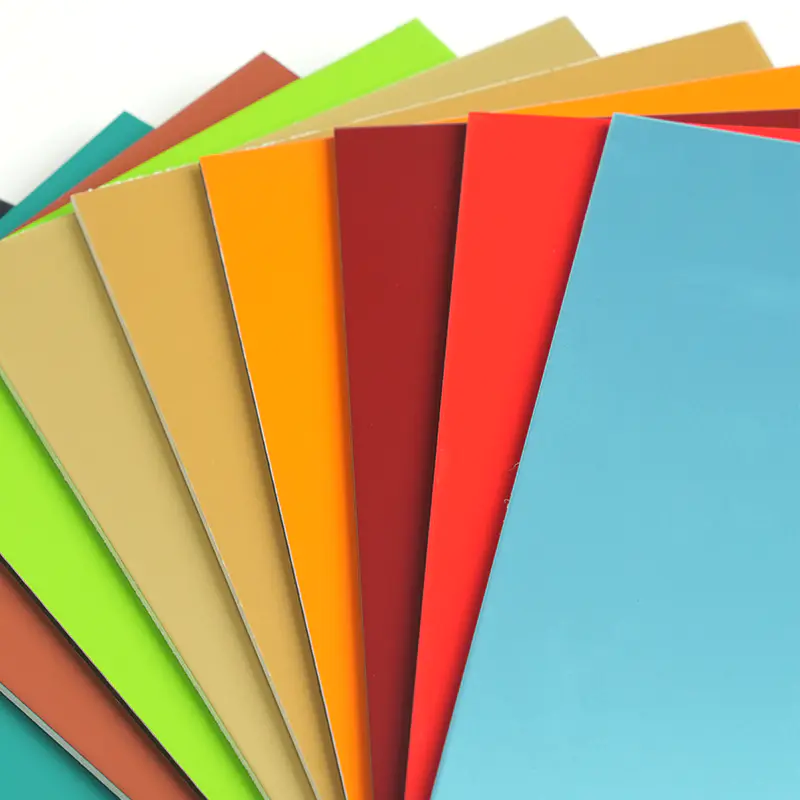ACP Composite Panels, also known as Aluminum Composite Panels, have revolutionized the construction and architectural industries with their exceptional properties and versatile applications. These panels consist of two thin layers of aluminum enclosing a non-aluminum core, offering strength, durability, and aesthetic appeal. Today, ACP panels are widely used in both exterior and interior architectural cladding, signage, and facades, providing modern design solutions with a touch of elegance and efficiency.
ACP Composite Panels are engineered building materials designed to offer lightweight structure and high rigidity. The core, typically made from polyethylene (PE) or a fire-retardant material, is bonded between aluminum sheets through advanced lamination processes. This composite structure gives the panels excellent dimensional stability and impact resistance.
Also referred to as aluminum composite sheets or sandwich panels, ACP panels come in various finishes such as solid colors, metallic textures, mirror surfaces, and even wood or stone patterns. These aesthetic variations make them a top choice for designers seeking both functionality and appearance.
Key Features of ACP Composite Panels
The popularity of aluminum composite panels can be attributed to their unique features, including:
Lightweight & High Strength: Despite their low weight, ACP panels provide excellent structural integrity, making installation easier and reducing building load.
Weather & UV Resistance: ACP panels are highly resistant to environmental factors such as rain, sunlight, and pollution, ensuring long-term performance.
Thermal & Acoustic Insulation: Thanks to their layered construction, ACP sheets offer good insulation properties, helping control temperature and sound transmission.
Fire Retardancy: Fire-resistant ACP composite panels are available, meeting safety standards for commercial and residential buildings.
Low Maintenance: These panels require minimal upkeep—just occasional cleaning to maintain their visual appeal.
Versatile Design: Available in a wide range of colors, textures, and finishes, ACP boards allow limitless design creativity.

Common Applications of ACP Panels
ACP composite panels are widely used across various industries and applications:
Building Facades: For modern building exteriors, aluminum composite panels deliver sleek aesthetics and protection.
Interior Cladding: Ideal for partitions, false ceilings, and wall panels, ACP boards add a refined look to interiors.
Signage: Due to their smooth surface and weather resistance, ACP panels are perfect for outdoor advertising boards and signage.
Corporate Identity Elements: They are commonly used in brand signage, canopies, and entrance portals for commercial spaces.
Transport & Industrial Applications: Used in vehicle bodies, container interiors, and industrial enclosures due to their durability and lightweight nature.
Advantages Over Traditional Materials
When compared to traditional construction materials like solid aluminum sheets, wood panels, or stone tiles, ACP panels offer several advantages:
Cost-Effectiveness: Aluminum composite panels are relatively affordable and reduce structural support costs due to their light weight.
Durability: Resistant to corrosion, termites, and decay, ACP cladding ensures long-lasting performance.
Flexibility: Easy to cut, bend, and shape, these panels accommodate creative architectural designs.
Sustainability and Environmental Benefits
Modern ACP composite panels often incorporate recycled materials in their cores, promoting sustainable construction practices. Furthermore, many manufacturers offer eco-friendly ACP panels with low VOC emissions and recyclable content, aligning with green building certifications like LEED.